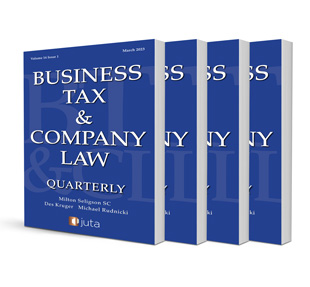
Foreign Pension Schemes: There be Dragons, and some Confusion: South African Members Qua Beneficiaries Have a Vested Right to the Income and Capital of the Foreign Pension Scheme (Trust) Ab Initio — Part 2
Author: Des Kruger
ISSN: 2219-1585
Affiliations: Consultant, Webber Wentzel, Adjunct Professor, University of Cape Town
Source: Business Tax & Company Law Quarterly, Volume 14 Issue 4, 2023, p. 22 – 29
Abstract
Given South Africa’s present political and economic position, a significant number of wealthy taxpayers are either engaged in making contributions to foreign pension schemes or are contemplating doing so. As the heading to this article suggests, the South African tax implications that arise when a South African resident taxpayer embarks on this journey are complex and confusing. Whilst SARS has provided some guidance in terms of a binding class ruling, this guidance is limited to the position where the South African participants participate in the foreign pension scheme as vested beneficiaries — not the general position. The ruling nevertheless provides some indication of SARS’ views as regards the application of the law in these circumstances. However, SARS neatly side-stepped the real issue, namely that a strict application of the law results in double taxation in certain instances by declining to rule on the application of section 25B of, and paragraph 80 of the Eighth Schedule to, the Income Tax Act, 1962. This article explores the South African tax implications that are triggered for South African residents in consequence of their participation as vested beneficiaries in these foreign pension schemes — the situation addressed in SARS’ binding class ruling. The South African implications that arise are wholly dependent on the rights and obligations that are established under the foreign pension scheme rules. However, as a general proposition it may be said that under a vested scenario the South African participants are required to make regular contributions to the foreign pension scheme, although lump sum contributions are allowed in certain instances. The contributions are then accounted for in a bespoke account, as is any accretion in value. When the time comes for payment of the retirement benefits (the income capital will already have vested in the beneficiaries), the trustees generally have a discretion as to the nature and value of the payments — but the participant has a right to request the trustees to exercise their discretion in a specific manner. The article concludes in the first instance that the contributions made by the South African participants to the foreign pension scheme do not constitute a donation that is subject to donations tax. As regards accretions in value in the bespoke account (e g interest, dividends, realised capital gains, the article argues that those amounts fall to be taxed in the hands of the resident Once the trustees exercise their discretion to pay the South African participants either an annuity or a lump sum, South African income tax or capital gains tax is triggered again. A possible double taxation conundrum accordingly arises should any income or capital derived by the foreign pension scheme have previously been vested in the South African beneficiary. On death, it is strongly arguable that the amount standing to the credit of the resident beneficiary in his or her bespoke account does not form part of the deceased South African beneficiary’s estate for estate duty purposes, or an asset for capital gains tax purposes.